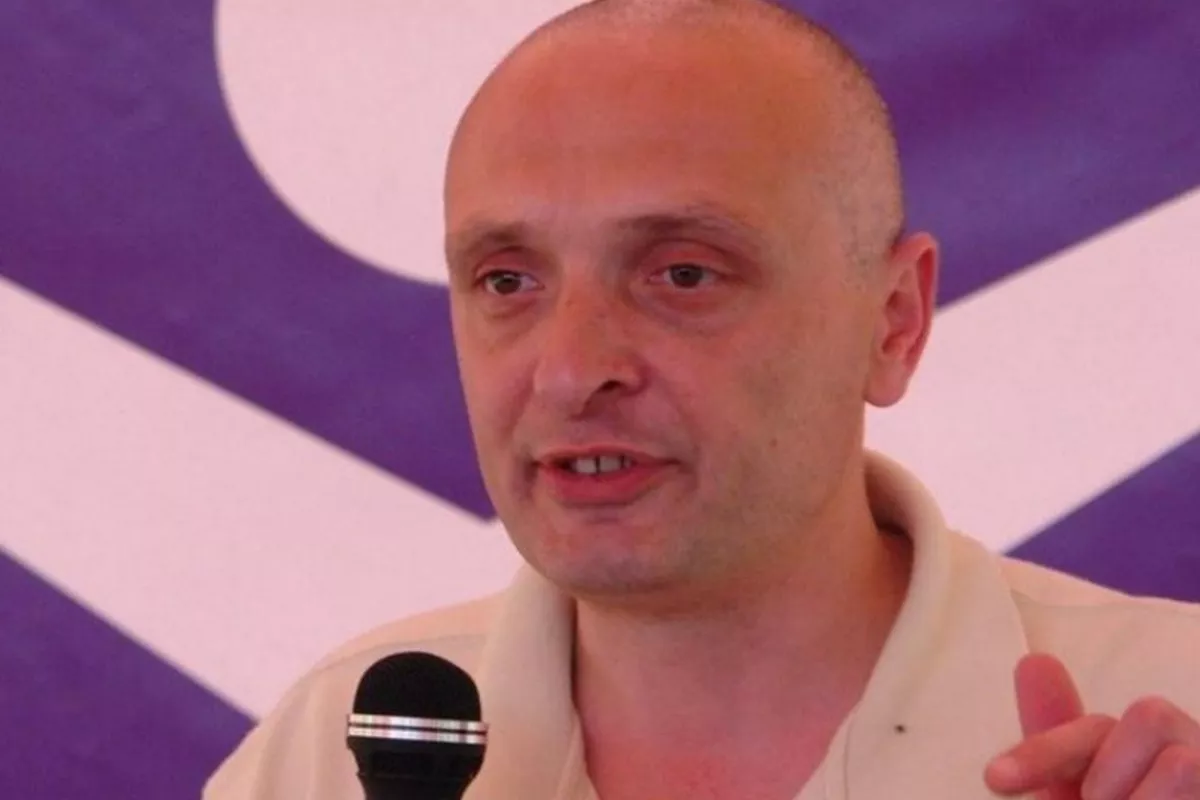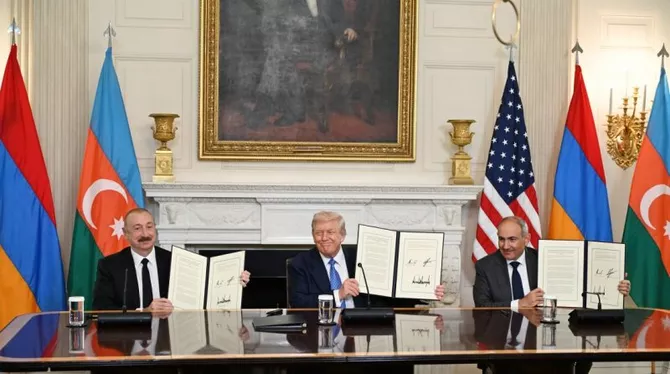
Georgian political analyst Gia Kuchava
Amid the ongoing reshaping of the security and logistics architecture in the South Caucasus, the Washington meeting between the leaders of Azerbaijan, Armenia, and the United States has given new impetus to the peace process. At the heart of the agenda are the practical implementation of the Zangezur Corridor, the interplay between competing and complementary transport routes, and Georgia’s internal political dynamics ahead of the municipal elections on October 4. To discuss the opportunities and risks this new reality presents for Tbilisi, Baku, and Yerevan, the future of the “Middle Corridor,” and why security is inseparably linked with trade flows, The Caspian Post spoke with Georgian analyst Gia Kuchava.
- How do you assess the outcome of the Washington meeting between Azerbaijani President Ilham Aliyev, Armenian Prime Minister Nikol Pashinyan, and U.S. President Donald Trump?
- The Washington meeting allows us to draw an important conclusion: Russia wanted to be the sole arbiter between Azerbaijan and Armenia. However, Moscow’s full-scale war in Ukraine has undermined Russia’s position in the South Caucasus.
After the end of the Second Karabakh War, Washington and Brussels tried to act as mediators, but there was no real progress. On certain issues, Azerbaijan took a tougher stance, while Armenia pursued compromise-yet compromise was not enough for Baku. One of the most problematic issues was the Zangezur Corridor. Moscow, which had tried to play the role of mediator, finally dropped its peacemaker’s mask after the signing of the agreement and, through its propagandists, began openly threatening Azerbaijan with war and Armenia with a coup.
The United States managed to bridge differences between Baku and Yerevan, acting not only as a mediator but also entering the region actively and positively-helping restore communications between Azerbaijan and Armenia and energizing economic ties between them.
Israeli diplomat Yosef Shagal believes that up to 15 million tons of cargo will pass through the Zangezur Corridor. That is a very large volume-and where there is trade, the guns fall silent. Reaching a peace agreement implies an even stronger security environment across the South Caucasus.

Photo: AZERTAC
- Do you think Georgia will benefit if the “Trump Route” is implemented?
- It is important to note the following: Georgia has found itself surrounded by warring countries-from the Azerbaijani-Armenian conflict in the south to the full-scale war between Ukraine and Russia. Add to this the uncertainty of when the North Caucasus might flare up. I am not even speaking about the territories of Georgia occupied by Russia. I believe that with the end of the war and the establishment of direct relations between Baku and Yerevan, Georgia will only benefit, since one hotbed of tension in the region will have been removed.
Some experts have described this project as the “Project of the Century.” This line of communication will continue from Nakhchivan across the territory of Türkiye, allowing the Zangezur Corridor to acquire the status of an international trade corridor. It will be economically important not only for Nakhchivan, but for all of Azerbaijan, Armenia, Türkiye, and perhaps partially for Iran-although I do not rule out that Azerbaijan and Türkiye will seek to minimize, or even prevent, Iran’s use of this corridor. Armenia, as Iran’s long-standing partner, may make efforts to ensure that Iran’s interests are taken into account. This is also suggested by Iranian President Masoud Pezeshkian’s visit to Yerevan on August 19. At that meeting, Prime Minister Pashinyan stated that it was “time” to raise Armenian-Iranian relations to the level of a strategic partnership.
The Zangezur Corridor should spur economic activity across the South Caucasus. But given the pro-Russian course of Georgia’s current government, there is a risk that it could undercut the Middle Corridor. I see two main factors at work:
1. The Zangezur Corridor will operate under international guarantees, leaving Russia with no leverage to instrumentalize it for political ends. 2. Inside Georgia, owing to Russia’s growing influence over the ruling Georgian Dream party, Moscow could affect the functioning of the Middle Corridor. If we add to this the anti-European rhetoric of Prime Minister Irakli Kobakhidze and other Georgian Dream leaders, the political environment becomes unfavorable for a corridor running through Georgia.That said, the Middle Corridor is not only a route through Georgia; it is a broader South Caucasus pathway. As stability in our region strengthens, its significance will grow further.
Naturally, with two parallel corridors, the busier one will be the safer and more cost-effective. Still, I want to emphasize that greater security and stability across the region generally attract new cargo flows, creating the opportunity to fully realize the potential of both corridors.
- Georgia’s Central Election Commission has completed registration of political parties for the municipal elections scheduled for October 4 this year. How do you assess the ruling Georgian Dream party’s chances?
- For the October 4 municipal elections, the Central Election Commission registered 17 political parties. It should be noted that two opposition parties which received the highest number of votes in last year’s parliamentary elections have lost their ballot numbers because they refused to participate in the municipal vote-the United National Movement and the Coalition for Change. Turnout in municipal elections is traditionally lower than in parliamentary ones, and the leaders of the boycotting parties are urging their supporters to stay home.
It should also be noted that in the 2024 parliamentary elections, taken together across the major cities-Rustavi, Kutaisi, Batumi, and Tsalenjikha-the ruling Georgian Dream trailed the opposition.
In the current circumstances, I expect Georgian Dream to win overall, although I do not rule out second-round runoffs in some cities’ mayoral races.

Photo: Shutterstock
- One of the leaders of the Girchi party, Iago Khvichia, has raised the idea of moving Georgia’s capital to Kutaisi. How relevant is this for the country today?
- The relocation of the capital is not only irrelevant; it is not being considered at all. I believe Mr. Khvichia’s initiative is connected to the fact that in the 2024 parliamentary elections, unlike in Kutaisi, the ruling Georgian Dream secured more votes in Tbilisi than the entire opposition combined.
By Asif Aydinly
Share on social media